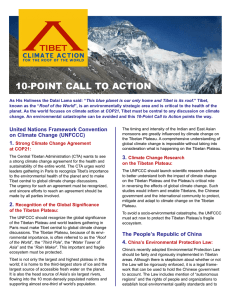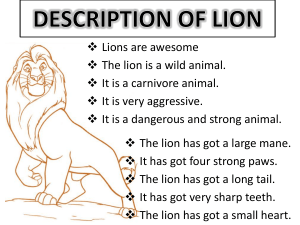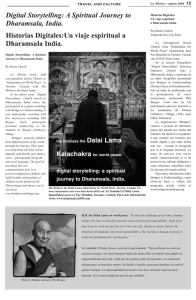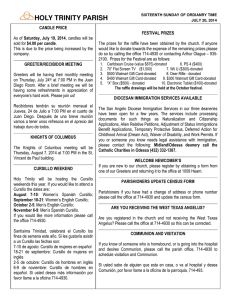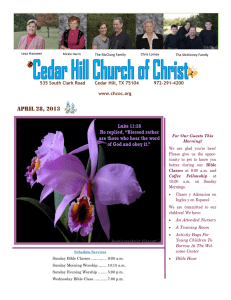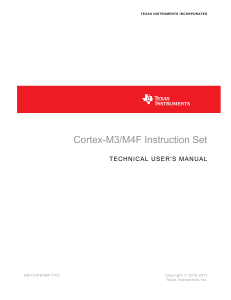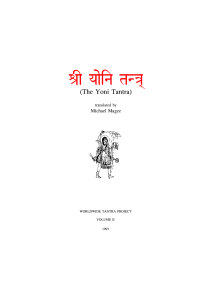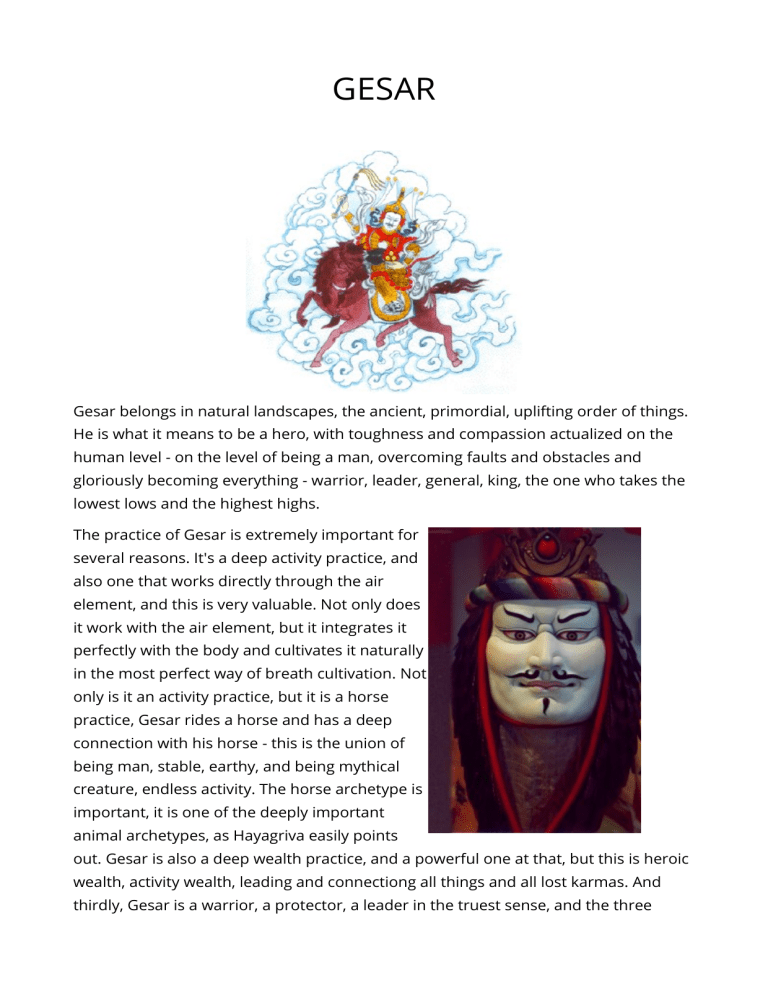
GESAR Gesar belongs in natural landscapes, the ancient, primordial, uplifting order of things. He is what it means to be a hero, with toughness and compassion actualized on the human level - on the level of being a man, overcoming faults and obstacles and gloriously becoming everything - warrior, leader, general, king, the one who takes the lowest lows and the highest highs. The practice of Gesar is extremely important for several reasons. It's a deep activity practice, and also one that works directly through the air element, and this is very valuable. Not only does it work with the air element, but it integrates it perfectly with the body and cultivates it naturally in the most perfect way of breath cultivation. Not only is it an activity practice, but it is a horse practice, Gesar rides a horse and has a deep connection with his horse - this is the union of being man, stable, earthy, and being mythical creature, endless activity. The horse archetype is important, it is one of the deeply important animal archetypes, as Hayagriva easily points out. Gesar is also a deep wealth practice, and a powerful one at that, but this is heroic wealth, activity wealth, leading and connectiong all things and all lost karmas. And thirdly, Gesar is a warrior, a protector, a leader in the truest sense, and the three aspects, of warrior, primordial activity, and useful, compassionate, meaningful wealth, intermesh endlessly. That intermeshing is the perfect union of space, air and consciousness (water). The practice of Windhorse, or Lungta, which actually means Horse of Space, is a traditional Tibetan practice for uplifting the energies of the body, of life, auspiciousness, connectedness and victory. I'll leave detailed descriptions of the cultural background and practice of Windhorse further on in the text, but here I will give a tantric explanation of the importance of the practice, based entirely on the Gesar mantra. Traditionally, raising windhorse involves external ritual: raising actual prayer flags and reciting prayers. This works because the prayer flag has power, it carries mantras and vibrates with the world, it makes merit and connects you, revitalizes your energies and makes them meaningfully at one with everything, and the prayers carry meaning that your conceptual mind can work with, learn from, grow with, and as you grow you learn to make powerful and auspicious aspirations that involve your own destiny and the destiny of others, reconnecting the primal elements of our natures into one mental flow. Aspiration is continuous, it is how we generate plans and strategies and destinies, out of the elements we understand and continuously work with, and we invest our life-force into this work, and according to the quality of our work and aspiration, life-force grows or weakens. Windhorse prayers contain many essential elements in a very quick and condensed manner,s o it is a way of reconnecting the conscious mind into simpler, more primordial flows. Later on in this text are extensive Windhorse Prayers you can read, preferably quite often, to infuse your vision. However, here I will talk about the Gesar mantra, which goes far beyond conscious prayer. Gesar is the uplifting interplay of space, air and consciousness. In the space of mind, he flies with true ease. Present. Going anywhere, doing anything that is to be done. Swiftness. This is the interplay of being fully present in space, having air naturally circulating in an active, uplifting manner, rising in emptiness, and presence and movement are in union with consciousness and its natural ever-fulfilling aims. Without this perfect union, air has blockages, space lacks the pure presence of compassionate involvement, and consciousness is dull, unfulfilled, and lacking primordial power. With this, there is endless victory of the compassionate hero. Gesar very quickly escapes entanglements, breaks complex situations, and establishes the auspicious and naturally heroic body. The inner air element never circulates fully unless it is fully connected to both natural presence and the full involvement with compassionate Vajra activity, the simplest purest presence of space, and the landscape of consciousness endlessly fulfilling is own compassionate aims. This is it, if you understand this, you can cultivate the breath. The breath is not just breath, meditate on this union of space, air and consciousness (water). You can cultivate activity, you can work with the Gesar mantra, you can do anything. The Gesar mantra teaches this, accomplishes this, powers this far more than any quick explanation I give here. It's perfect, and uplifts the right-side karmic body in a matter of (arduous) days or weeks, a work and journey that would otherwise be impossibly difficult and measured in decades. Gesar Victory Mantra om ah hum vajra maha guru mani raja sarva siddhi pala hum Gesar Short Mantra om guru mani raja siddhi hum The Victory mantra is quite difficult at first, despite not being very long. Practice the short mantra first, it is appropriate for everyone. I'll mention here, there is also a practice associated with Gesar, the practice of drawing, or writing, with spontaneous awareness. When the realization of the mantra sinks in, even the smallest details become so perfect that you start to gain true understanding of your own signs, a single line of writing, a single stroke, becomes true beauty, perfect victory. You start generating meaning in everything. Every thought and appearing image, like a pencil line. Mind is prior to it. Everything naturally effaces into beginningless mind, before everything. Everything a master stroke, perfect, the first of its kind. The one who can accomplish the activity of a single stroke, without doubt or regret, can accomplish anything. The four legs of Gesar's horse are the four mythical Vajra animals: Tiger (Air), Snow Lion (Earth), Garuda (Fire), Sky Dragon (Water). I will explain these four in the context of a comprehensive system at a later time, but they represent a healthy path of growth in both inner cultivation and any kind of activities. Achieving the qualities of the four Vajra animals, in this order, will ensure dynamic stability and gives a quick, intuitive system for realizing what you're doing good and what you're doing wrong. In short, they are: Tiger - Mastery over impulses Lion - Master over form/energy Garuda - Mastery over neurosis Dragon - Mastery over power And in more detail: Tiger - Air, unconditional confidence, disciplined awareness, kindness, modesty, relaxed yet energized, gentle state of being with natural satisfaction Snow Lion - Earth, unconditional cheerfulness, mind free of doubt - clear and precise. Beauty and dignity of mind-body union. Youthful, vibrant energy of goodness, natural sense of delight. Garuda - Fire, freedom from hopes and fears. Daring, fearless. Great strength and power, no holding back, soaring beyond the beyond, mind without reference point. Sky Dragon - Water, dynamic qualities of the natural world, sequence of weather and seasons, mind beyond ego, everpresent. Energetic, powerful and unwaivering, creates and environment of fearlesness, warmth and genuineness. Gentle play. Generosity, spontaneous achievement, elegance and equanimity. Cultivate your qualities in this way, it will keep you safe and growing. Notice when your qualities increase, and when they decrease. It is inevitable, but if you learn to deal with it, that is when you truly grow and accomplish the four Vajra animals. "His (Gesar's) skillful chestnut steed Outwardly manifests as a horse Inwardly, he manifests as the mind of enlightenment, He is the emanation of Hayagriva He is elegant, with a rainbow swirling about, He has the treasure of the gait of swift wind and the strength of the wings of birds, He possesses the glorious strength of a snow lion, His vajra mane flowing right and left Magnetizes the drala of white conch garuda, The vulture down on the points of his ears Magnetizes spies of luminous torches, His forelegs of wheels of wind Magnetize the drala of the lord of life, The four hooves of the steed Magnetize the drala of swift wind, On the tip of each hair, lha (gods) reside. If you do not protect me, your child, who will you protect? Accept this purification and warrior drink, Increase your power of swiftness, Miraculously lead me to the place I desire, Accomplish my desires Arouse the activity of wind horse, O horse, pu pu so so ca ca, increase!" Story of King Gesar Versions of the story often begin with the creation of the world and a compacted prehistory of Tibet. This is followed by a brief traditional account of how Tibet was converted from barbarity to Buddhism under the three great Dharma Rajas (Tibetan: Chos rgyal) of the Tibetan Imperial Period (seventh-ninth centuries C.E.), in particular by the great magician and founder of Tibetan religion, Padmasambhava (Tibetan: Padma 'byung gnas), who subdued Tibet's violent native spirits and bound them by oath. It is then explained how, later on, the world in general, and Tibet in particular, fell into a state of anarchy because the many negative spirits and demons of Tibet had not been fully conquered. As a result, the world came under the dominion of hordes of flesh-eating and human-eating demons and goblins, led by the malignant and greedy kings of many kingdoms. To remedy this situation, various gods-on-high, including Brahma (Tibetan: Tshangs pa dkar po) and Indra (Tibetan: Brgya byin) in concert with celestial Buddhist figures such as Padmasambhava, and both cosmic and abstract tantric deities such as Amitabha (Tibetan: 'Od dpag med) and Samantabhadra (Tibetan: Kun tu bzang po), as well as the spirits below the earth or nagas (Tibetan: Klu), decide that a divine hero must be sent from the heavens to conquer these evil sovereigns. The decision is made to send the youngest son of Tshangs pa or brgya byin (the Gesar texts tend to conflate Brahma and Indra). He is known by various names in different versions, sometimes thos pa dga,' sometimes bu tog dkar po, but perhaps the most universally used is don grub. This god-child is not very keen on his mission, and tries to evade it, but eventually agrees. With various celestial companions, he is then born, after singing to his mother from the womb and asking the way out, as the son of Gog bza (in some versions, a beautiful naga princess captured from a neighboring tribe, and in other versions, an old woman) and Seng blon, one of the respected elders of the Kingdom of Ling. In most Tibetan versions, Ling is located in eastern Tibet (Tibetan: Mdo khams), often between the 'Bri (Yangtze) and rDza (Yalong) rivers, which is where the historical kingdom of Lingtsang (Tibetan: Gling tshang) existed until the twentieth century. Our earth is wounded. Her oceans and lakes are sick; Her rivers are like running sores; The air is filled with subtle poisons. And the oily smoke of countless hellish fires blackens the sun. Day has become night. Fish are born deformed; birds fall lifeless from the sky. Forests and plains wither. Animals running in futile search for shelter and food Collapse and die. Men and women, scattered from homeland, family, friends, Wander desolate and uncertain, scorched by a toxin sun, Prey to empty longings, strange diseases and sudden death. Nor is night a cooling time of moonlit rest, But a fearful frame-lit void Of sirens, cries and murderous phantoms. In this desert of frightened, blind uncertainty, Some take refuge in the pursuit of power, of knowledge and technique; Some become manipulators of illusion and deceit; Some take refuge in realms of self-satisfied passion; And some build up a golden wall of simple wealth. Men have become robots and zombies As they have made these hopes and fears Their ruthless demonic lords. If goodness and bravery still dwell in this world As other than a flickering shadow on the edge of sleep, If wisdom and harmony still dwell in this world As other than a dream lost in an unopened book, They are hidden in our heartbeat. And it is from our hearts that we cry out. We cry out and our voices are the single voice of this wounded earth. Our cries are a great wind across the earth. The juniper smoke rises on this wind, And on this bridge of longing, as we sing of him, Gesar himself, the ever-youthful Lion King decends Surrounded by flags and pennants snapping in the wind To forge the weapons that cut the life force of fear and doubt, To subdue and destroy the demonic hordes, And to establish the kingdom of freedom, confidence and joy That dwells eternally in the hearts of all. The hero’s older half-brother, rGya tsha, is a brave warrior and important figure in the epic. He is sometimes said to have been the grandson of the emperor (Tibetan: Mi chen, literally: "Big man") of China, and is killed in a battle with the great enemy of Ling, Hor (often identified by Tibetans with Mongolia). This struggle between Ling and Hor is central to the epic. The young hero has two uncles. One, the wise and very aged elder of Ling, known as the "old hawk," sPyi dPon rong tsha, supports the child and has received divine prophecies indicating his importance. The other uncle, Khro thung, is a cowardly and greedy rascal, who sees the child as a threat and tries to do him ill. Khro thung is normally a comic character in the epic, and an instigator of many incidents. The precocious child grows rapidly and vanquishes a number of foes. His behavior is wild and fearsome, and soon he and his mother are banished from Ling. They go to the deserted lands of the land of rMa (the upper Yellow River) where they live in the wilderness, and the child is clothed in animal skins and wears a hat with antelope horns. When the child is twelve, a horse race is held to determine who will become the King of Ling and marry the beautiful daughter, Brug mo, of a neighboring chieftain. The hero-child, who in many versions is known as Joru during his youth, returns to Ling, wins the race, marries Brug mo, and ascends the golden throne, assuming the title "Gesar." His first major campaign as king is against the man-eating demon of the north, Klu bTsan. After defeating the demon, Gesar is put under a spell by the demon’s wife, and loses his memory for six years. While he is away, his beautiful wife is kidnapped by Gur dKar (literally: "White tent"), the King of Hor. Gesar eventually returns, uses his magic to enter the king of Hor's palace, kills him, and retrieves his wife. (in another version the demon is called Lutzen) Gesar's Liberating Song for the Demon Lord: Lutzen, Demon Death Lord of the North, I am Gesar, King of Ling. Lutzen, Demon Lord of the North, Because of me, you have known fear. Because of me, you no longer rage in the limits of your form. Because of me, now you enjoy the great natural freedom. Lutzen, Demon King of the North, I am Gesar, Lion King of Ling. Together, we have played out a certain drama Where you were a demon and I, a king. Now, while I must continue to play out this part, You are unfettered. Fear and death are now self-liberated. Your mind, dense with sensation, rage and guile, Filled with death and enbodying death, Is now cut through, Is now pure naked awareness. Your dark and shifty realm of paranoia and rampant appetite, Filled with fear and perpetuating fear, Is now destroyed, Is now limitless vast space. While the seeming gap between space and awareness Made you struggle for existance, Now there is only the brilliance of limitless expanse. Lutzen, do no toy with doubt or regret. Rely on this alone. The seeming opposition between life and death is now cut through. You are now experiencing the true nature of all, The hidden real aim and end of all actions, The inner true quality of all desires. Do not be tempted to resume your armaments. Do not thrash or lunge or flee. Simply rest in wakefulness. Do not stir, for there is nothing to be achieved. Simply rest in space. There is no longer a container or anything to be contained. This is the limitless brilliance of primodial wakefulness, The heart essence of deathless life. However vivid are the mirages arising in this great mirror, Know that this mirror is mind. Do not grasp at these phantoms of existance, Recognize that this mirror is both mind and beyond mind. Shine in this radiant mirror of confidence. Rest in this sonorous mirror of eternity. All is resolved in dazzling measureless freedom. Open your heart, Lutzen, be confident. Do not hold back. You are dissolved. Words spoken by Gesar to his wife, who during his absence has fallen in love with his enemy, and borne him a son Sechan Dugmo, queen and wife, Remorse at what each of us has done, Anger at what each of us has seen the other do, Sorrow that true love has proved so fragile, Sadness that passing love has been compelling and disastrous, Doubt that even genuine love can be restored, Fear that neither decency nor joy has a place In such deceitful and dangerous terrain, All these things, O dear companion of my heart, Seem to separate us so, and yet, We share them utterly. These episodes are the first two of four great campaigns against "the four enemies of the four directions." The next two campaigns are against King Sa dam of 'Jang (sometimes located in Yunnan), and King Shing khri of Mon (sometimes located in the southern Himalayan region). Gesar then goes on to defeat the "eighteen great forts," which are listed differently in each version, but nearly always include sTag gZig (Tajik), and Kha che (Muslim) adversaries. Many (some versions say 40) other "forts" (Tibetan: Rdzong) are also vanquished. When Gesar reaches his eighties, he briefly descends to Hell in the last episode, before falling off his horse and leaving the land of men to ascend once more to his celestial paradise. Another version has him simply flying up to heaven on his horse. Location of the Kingdom of Ling The mythological and allegorical elements of the story defy place and time, and several places lay claim to being the former Kingdom of Ling. Both Tibetan and Chinese experts have generally agreed that the most likely birthplace of King Gesar is Axu town on the prairie of Dege County, located in the Garzê Tibetan Autonomous Prefecture of southwest Sichuan Province, which lies in the historic kingdom of Lingtsang, a significant eastern Tibetan principality from at least the early fifteenth century. Gesar's "soul mountain," would then be the famous snow peak of Golog, Amnye Machen, in modern Qinghai Province. Though the Epic of Gesar contains elements of ancient Tibetan mythology and Indian tantricism, the narrative became a vehicle for Buddhist teachings during the eleventh century, illustrating a Buddhist world view and evoking self-reflection in its audiences. Dear friends, when a raindrop falls into a still pond, It dissolves inseparably in its own nature, And nothing has occurred. But when the same raindrop falls into the same pond, Ripples shine and dance on the water's skin. From these two ways of seeing one thing Come the true magic that raises and destroys kingdoms, That increases joy or misery, brilliance or degradation. The Swift Infusion of Blessings: A Guru Yoga of the Great Embodiment of Unchanging Awareness Wisdom Emaho! In the sky before me is an expanse of rainbow-coloured light, With vast, cloud-like gatherings of dralas and deities of the Three Roots, Out of which appears the Supreme Being, Gesar Norbu Draddul Tsal, Inspiring, replete with blessings, and smiling with joy. Protector, embodiment of all the Buddhas, Compassionate One, Nirmanakaya emanation of the great and glorious Orgyen, Lord, who embodies the three buddha families, great lion Gesar, Like a child, in a state of intense and fervent devotion, I pray to you, my kind father, from the depths of my heart. In your wisdom mind, which never parts from the state of clear light, Great clouds of loving kindness and compassion are amassed now and for ever more, And for the disciples with the right karma and aspirations from the past, Your compassion brings down a powerful rain of blessings and inspiration. Even within the battle dress and armour of the brave drala warriors, Appear countless mandalas of the deities of the Three Roots— Merely by thinking of you all, we are inspired with great and powerful blessings. The male warriors perform their imposing dance of war, The female warriors sing their captivating songs, The horses pant and neigh excitedly, And the brave dralas bellow with laughter. For us, whose minds are filled with devotion and joy, Do not neglect your promises and commitments, but grant us your blessings— Make our bodies a stronghold of drala warriors, Empower our speech with miraculous force, And arouse in our minds the awareness-power of bliss and emptiness! Make us one with you, Lord Gesar, forever inseparable! Repeat the following as many times as you can: O lama, care for us! And: O lama, Great Being, Wish Fulfilling Jewel, care for us! om ah hum vajra maha guru mani raja sarva siddhi pala hum At the end of the recitation, consider that you merge inseparably and settle in an experience of dharmakaya, beyond the ordinary mind. Blessings will enter swiftly and signs will appear as rigpa’s creative power. If you pray like this for seven days you will surely be held and cared for. In a state transcending the ordinary mind, this was composed by Rigpé Dorje, Who has received the blessings of the Great Lion Gesar in abundance. Prayer to Gesar Embodiment of the three buddha families, Through the compassionate light rays of Pema Tötreng, you arose as the splendour of the world— Supreme being, great lion, Norbu Dradul, to you we pray! Grant us supreme and ordinary siddhis! om guru mani raja siddhi hum Prayer to Dhvajagra Keyura Omṃ! We take refuge in the gurus, the yidams, and in you, Dhvajagra Keyura, Along with all your retinue! By the power of this fervent prayer of ours, Quickly protect us from all failure and misfortune! om hum svaha O Dhvajagra Keyura, and your retinue: With the force of your magical display, for us, our benefactors, and all those around us Avert all bad dreams, and those who have ill thoughts or do us harm! Avert spells and curses, dispute and conflict! Avert all weakening in our life-force, body, wangtang and windhorse! Avert all illness in men and women, all loss of our resources! Grant us long life, merit, glory and renown, and Make peace and happiness reign, throughout both day and night! (Dhvajagra Keyura translates as Ornament on the Top of the Victory Banner) Brief Windhorse Practice of Tārā Through the Blessing and Power of the unfailing Buddha, Dharma and Saṅgha, Mother of the Buddhas, noble Tārā, May our Life-span, merit, prosperity and renown Increase like a waxing moon, like a rising summer lake. Especially may our good fortune, wang tang and windhorse, Be healed when they weaken, rejoined when interrupted, raised up when sinking down; May whatever we do turn out well, And may long Life, good health, peace and Happiness be ours! Raising the Windhorse Kyé! The universe and its inhabitants, the expanse of the five elements, Are the five mothers: from the space of their wisdom mind All you deities of the windhorse, throughout samṃsāra and nirvānṃa, Come, approach! I offer the flag of the windhorse: Increase our renown, rouse our windhorse, and With your enlightened activity make us victorious over all! Brief Windhorse Invocation Ho! The great flag of the windhorse, auspicious and sweet-sounding far and wide Sends out a vast cloud of exquisite offerings, like those of Samantabhadra. Through this offering, we pray, may the Three Roots—guru, deva and dṃākinī— protectors, dralas, and gods in action, Make all our aspirations be spontaneously fulfilled! The Swift Fulfilment of All Wishes—Offering the Flag of Windhorse Ho! Within the all-pervading purity of primordial wisdom, Appearances arise, unceasing, as the ornaments of my perception; And the great flag of the windhorse, auspicious, sweet-sounding far and wide, Sends out, like Samantabhadra, a vast cloud of exquisite offerings. Miraculous and mighty is the king of horses, Bālāha Adorned with the jewel of many kinds, he soars like the wind, And travels, unimpeded with his indestructible strength, wherever we so wish. From his four miraculous limbs, there spread out In the four directions, a tiger, lion, garudṃa and dragon, taking flight and soaring in the sky. Over the earth the air, and through the whole expanse of space, Sounds of happiness ring out, of goodness, victory and accomplishment, In songs of auspiciousness, with the resounding drum beat of the gods, And melodious strains of music. While flowers fall like rain, Clouds of divine offerings pervade every direction, And all that is excellent throughout the three worlds— Auspiciousness, glory and riches—manifests spontaneously. This vast offering treasure, containing all that could ever be wished for, We offer to the root and lineage masters, the peaceful and wrathful yidam deities, The dṃākinīs of the three places, and oath-bound Dharma protectors, Dralas, wermas, wealth gods and treasure-keepers, Local deities, masters of the earth who safeguard what is beneficial and wholesome, And all you guests who care for and protect us— At this point, should you wish to address prayers to particular deities, you may insert verses such as these: Gesar Especially you, Gesar Norbu Dradul, With your miraculous, wild and skilful vajra steed, Your fearless warriors, ladies, attendants and envoys— We pray to you, make offerings, praise and exalt you! Your awesome majesty we glorify as high as the dharmadhātu! Hayagrīva You who magnetize all appearance and existence, deity of power, ‘Mighty Lotus’ Hayagrīva, With all the deities of your manṃdṃala, attendants and emissaries— We pray to you, make offerings, praise and exalt you! Your awesome majesty we glorify as high as the dharmadhātu! Ganapati Glorious protector Ganṃapati, with your consort, Protectors of body, speech and mind, and protectors of the eight classes in the ten directions, Standing amidst the divine troops your whistle strikes down the trilocosm We pray to you, make offerings, praise and exalt you! Your awesome majesty we glorify as high as the dharmadhātu! Magyal Pomra Great guardian of the eastern lands of Dokham, Magyal Pomra, with your entourage and attendants, Masang wermas and dralas, with all your ladies— We pray to you, make offerings, praise and exalt you! Your awesome majesty we glorify as high as the dharmadhātu! Then, returning to the main prayer: We pray to you, make offerings, praise and exalt you! By offering you these supremely delightful and pleasing gifts, Let the forceful vajra wind of your power and strength, For us practitioners and those around us, Increase our life, prosperity, merit and the strength of our windhorse. And with your actions, unimpeded in any way, make whatever we wish for come to be, just as we desire. Transform everything that hinders and troubles us into an ally, Hoist high the inspiring flag of auspiciousness and virtue, Overcome all that oppose and stand against us, And, with your enlightened activity, make us victorious over all! Gesar—Great clouds of offerings for prosperity Bless food, drink and the necessities of life, whatever is suitable; mentally one should offer them in this way to the Great Lion Gesar and hosts of terma lords and wermas. And then: Omṃ āhṃ hūmṃ! Before me in the sky, amidst a white cloud of nectar Is the wish-fulfilling jewel who increases prosperity, Gesar, great king of the dralhas, Surrounded by Magyal and the rest, terma lords and wermas. This great gathering of the necessities of life, all that one could ever need of food, drink and wealth, As a source of the wisdom nectar fulfilling all that one desires, This sublime and blessed offering We offer to you, Supreme Being, Norbu Dradul Tsal, together with your retinue; You see clearly and distinctly the whole of phenomenal existence without exception; Whether high or low, or in between, you hold all beings with your love. Like a wish-fulfilling jewel, you grant all of our desires. To your hosts of wermas, fulfillers of wishes, we offer praise. Think of us with compassion, lord of the mighty dralas, From the depth of your infallible and steadfast jewel-like wisdom mind, With a great shower of whatever we might desire of prosperity, abundance, food and wealth, May you fulfil completely all our hopes and expectations! Combine this with offerings of tea and so on. Wherever you might be staying, whether at home or abroad, if you wish for food, wealth and possessions, through the auspicious connection of reciting this practice every day or on specific occasions, you will acquire the four treasures of longevity, glory, wealth and prosperity, fulfilling all your wishes and requirements. WINDHORSE The expression of windhorse as an image of spiritual and cultural significance is most visible in Tibetan culture as the omnipresent display of brightly colored and inscribed prayer flags in strategic places and sacred sites around the Tibetan world. It has its parallels in the colored prayer ties employed in Lakota ceremony. The custom of putting up prayer flags has also caught on in the modern West to a certain degree, where it is not uncommon in some places to see prayer flags hanging from trees or porches. The popular explanation of lungta is that it refers to "good fortune" or "luck". Surprisingly, a fair amount of the academic literature on Tibetan culture stops at this (with notable exceptions). But "luck" is a shallow sense of lungta. Windhorse refers to something much more basic and vital than mere "luck", at least in the Western sense of the word. For instance, the prayer flags themselves are referred to as lungta, and are inscribed with drawings of the windhorse, accompanied in the cardinal directions by four other animals, each with its own symbolic significance (Tiger, Lion or Yak, Garuda, Dragon). Everything inscribed on the prayer flag, images, sacred mantras and prayers, is engaged to invoke and actualize the primal force represented by the image of windhorse, as well as ignite a visceral experience of it in one's body and mind. In addition, such a force can set into motion influences that can shape events in society and nature. The term windhorse also refers to the fact that the flags blow in the wind, or "ride" the wind, whereby the power of the sacred images and invocations printed on them are dispersed into the world at large, benefitting many levels of beings and the natural environment. The virtue accrued from the act of raising prayer flags then carries on into the life of the person(s) offering them, and to those whom they dedicate the merit of such an offering. This is possible because of the total interdependence of all mind, life and phenomena. Through such ritualistic gesture, joined with wholesome, magnanimous intention, that web of interdependence (Tibetan: tendril) can be accessed and influenced. With respect to humans, lungta carries with it qualities, such as would be evident in a person with natural dignity, integrity, high spirits, fortitude, exuberance, robust health, charisma, a fresh sense of humor, and so forth. A person's lungta is "up" when one feels these qualities in concert, or observes them in another, as in "He has good lungta today!" Conversely, if one is beaten down or depressed, lackluster, and not connecting to the events of their own life and their environment well, then it is said their lungta is "down". As a consequence, they are vulnerable to sickness, attack from others, misfortune, and so forth. A person's lungta is a register of their relative synchronization with their own body and mind, and the world around them. So in this regard, lungta also has a protective function when successfully invoked. Tibetan spirituality is replete with methods, rituals, and practices to "raise lungta", or revive and stabilize windhorse. On the more immediate level, one can take one's posture, breathe in fresh air, revive one's sense of humanity, dignity and presence, and then project that out to their world in order to synchronize oneself with people and events in the world. Another way of arousing windhorse is to wear good decent clothes, although it is also said that if one's lungta is strong, whatever one is wearing is splendid. In Tibetan culture, for instance, the new year, losar, is celebrated in one's finest attire, and always with at least one new item of clothing. This kicks the year off by raising personal lungta. More ritualistically, there are practices designed to arouse windhorse, both in the individuals participating, and in the environment around them. Such practices include, again, the putting up, or "raising" of windhorse prayer flags, especially at places in nature regarded as sacred and potent. Windhorse flags are also raised where there is potential danger, natural disaster, or mishap, such as where the land, for example, has been depleted by fire, where a tragic accident has occurred, or at the confluence of rivers, which is believed to be a locale of capricious, potentially destructive energy. The lungta flags in this case are to restore vitality, and protect from further mishap. A vertical windhorse banner, called a Dar-chok, mounted on a flagpole adorns the roof of nearly all Tibetan households, as a constant conduit of windhorse to the household. Divination is also sometimes requested from a lama to determine which type of lungta (there are many), or prayer flags, should be raised to address a particular situation, and where best they should be raised, sacred sites especially being of particular potency for raising lungta. People will also put up prayer flags at sacred sites of pilgrimage as an essential offering and supplication, and to connect with the power and blessings of the place. The dar-chok, the vertical pole adorned with a lungta banner, is also said to join humans with their divine origins in the wide open sky and space, or perhaps the wide open space of human nature and awareness. Tibetan mythology recounts that early humans were born with a mu cord, a shaft of light extending from their head to their origins in the sky. At some point in time, due to acts violating this primal sanctity, this vital connection was severed, and the mu cord disappeared. But the raising of darchok reestablishes this connection, and thus invokes the treasury of windhorse implicit in it. The same connection was reignited in marriage ceremonies by the placing of colored threads on the shoulders of the couple, or placing a brightly colored arrow in the back of the blouse of the bride, extending up over her head. This same gesture was then rendered into the placing of white scarves over the shoulders of others, the omnipresent Tibetan manner of honorifically greeting someone. There is a whole class of practices in Tibetan culture known as sang, which is the ritual offering of juniper smoke or sage from a fire, accompanied by a liturgical invocation. These practices have an intimate connection with windhorse. The sweet, pleasing smell of the smoke billows up to the heavens, which is the abode of various divinities (Tibetan lha) who are embodiments of abundant atmospheric lungta, and from whom lungta is invited down onto the earth and its recipient inhabitants. For instance, Tibetan villages, towns, and communities are in proximity to an associated local sacred mountain or hill, from the upper reaches of which a sizable sang smoke offering is made annually during New Year celebrations. At the conclusion of the liturgical invocation, everyone present will let go with a shout at the top of their lungs, in unison, "Ki Ki So So, Lha Gyal Lo", or "May the gods be victorious!" This very voicing of this "warrior cry" is also a way of rousing windhorse. Most Tibetan households have a sang bum or smoke offering pot on the roof of the house, often in front of or near the Dar-chok vertical prayer banner. Sang is offered daily, in the early morning, to make offerings to the lha (deities) and invoke windhorse into the household. On the inner household level, a small, portable sang bum is used to burn juniper on coals, creating the invocational smoke. The pot is then taken around the house to both purify the various rooms of disruptive influence and magnetize propitious circumstances. Individuals, at that time, use their hands to waft smoke over their bodies, for the sake of clearing personal obstacles and inviting windhorse into one's body and mind. The notion of "goodness" is that the fundamental nature of the world and its inhabitants, and the entire scope of phenomena, is without conflict and replete with nurturing qualities. It is characterized in various contexts as "basic intelligence", "awakened nature", "the fundamental inseparability of wisdom and compassion", "the natural state", and in many other ways, all meant to indicate this only seemingly elusive yet perpetually present and available bottom line of life and being. From good windhorse, then, come many other boons and qualities of value to human existence and the environment: good health, prosperity, powerful personal presence, successful crops, absence of hail and pestilence, just leaders, harmonious relations in society, good business and so on. But equally, windhorse evokes the bravery, strength, and fortitude to deal well with bad health, scarcity, downturns in circumstance, corruption, calamity, drought, pestilence, hail, invasions, and so forth. The bottom line, though, is that for windhorse to be harnessed, the intention must be that it is for the benefit of all beings, not just oneself or one's immediate companions. Windhorse, like basic goodness, is not something solid (wind), so can never be captured, domesticated or privatized, but can always be harnessed and ridden (horse).
